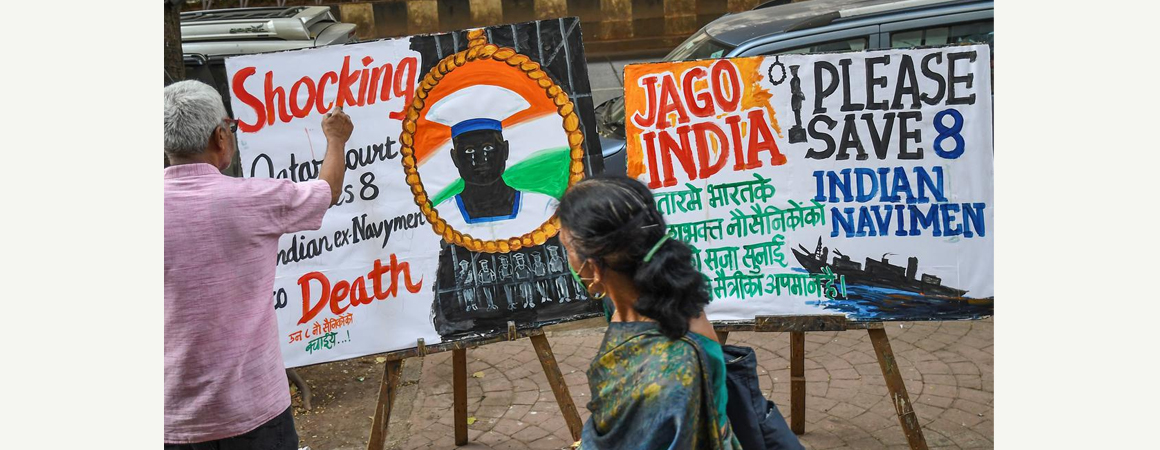India has considerable strategic and diplomatic leverage with the Gulf country and royal family which should be used to help Indians sentenced to death reportedly for espionage
A day after the death sentence was handed down by a Qatari court to eight Indians, as the Ministry of External Affairs (MEA) awaits the detailed judgment in the case, experts said India must pursue all efforts, including political appeals at the highest levels to ensure the Naval veterans, reportedly accused of espionage, are brought back to India.
“Multiple options exist,” said Syed Akbaruddin, former Indian envoy to the United Nations and an expert in the Gulf region, pointing out that apart from the legal appeals process, a final decision on the implementation of the judicial outcome could be made by Qatar’s head of state. He also pointed to a 2015 agreement on the transfer of sentenced prisoners in case India’s appeal for clemency is accepted. “In short, there is enough space to address the sensitive but unprecedented issue in a manner that preserves the trajectory of bilateral ties,” Mr. Akbaruddin added.
In March 2015, during the visit of Qatari Foreign Minister Dr. Khalid Bin Mohammed Al Attiyah to India, one of the agreements exchanged between the two countries was on “Transfer of Sentenced Persons”. “Under this agreement, Indian prisoners convicted in Qatar can be brought to India to serve the remaining part of their sentence. Similarly Qatari citizens convicted in India can be sent to their home country to serve their sentence. This agreement would enable the sentenced persons to be near their families and would help in the process of their social rehabilitation,” the MEA had stated. A year later, Prime Minister Narendra Modi travelled to Doha for a bilateral visit where several other agreements were signed, and also met Qatar’s Emir Sheikh Tamim bin Hamad Al Thani in 2019.
“Under this 2015 agreement, convicted individuals can be repatriated to serve out the sentence at home. Sentence of Indian Navy veterans must be commuted or pardon obtained and this agreement invoked,” former Naval Chief Admiral Arun Prakash, who has consistently been raising questions about the case, said on social media on Friday. He also asked whether due process was followed, or whether the eight retired Naval personnel had been “properly defended during the secret trial?”
Defence cooperation pact
According to some experts, India could also leverage other parts of its strategic ties with Qatar to pursue its case for the men. In 2008, India and Qatar signed a Defence Cooperation Agreement during the visit of then Prime Minister Manmohan Singh to Doha in November 2008 which has been extended every five years, the last time in November 2018. “The agreement has not yet been renewed,” an official source without elaborating further said, a possible indication of an opportunity for high-level negotiations in the near future. India also offers training slots in its defence institutions to Qatari military personnel, and regularly participates in the biennial Doha International Maritime Defence Exhibition and Conference (DIMDEX) in Qatar.
Others stressed the importance of working “behind the scenes” with bilateral consultations at senior levels. “This is not a matter for public discussions or jingoism as we have seen in the recent case of Canada. The issues involved are sensitive and the stakes are high given the number of Indians working there,” said former Ambassador Talmiz Ahmad, who has authored a book on West Asia. “Apart from avenues of judicial review, we must recognise that above all there is the royal family that attaches a very high value to their relationship with India, and a royal pardon could still be hoped for,” Mr. Ahmad added, pointing out that this is an exceptional and rare case involving espionage by Indians anywhere in the Gulf region.
Pursue all legal, political options in Qatar case: experts
India has considerable strategic and diplomatic leverage with the Gulf country and royal family which should be used to help Indians sentenced to death reportedly for espionage
A day after the death sentence was handed down by a Qatari court to eight Indians, as the Ministry of External Affairs (MEA) awaits the detailed judgment in the case, experts said India must pursue all efforts, including political appeals at the highest levels to ensure the Naval veterans, reportedly accused of espionage, are brought back to India.
“Multiple options exist,” said Syed Akbaruddin, former Indian envoy to the United Nations and an expert in the Gulf region, pointing out that apart from the legal appeals process, a final decision on the implementation of the judicial outcome could be made by Qatar’s head of state. He also pointed to a 2015 agreement on the transfer of sentenced prisoners in case India’s appeal for clemency is accepted. “In short, there is enough space to address the sensitive but unprecedented issue in a manner that preserves the trajectory of bilateral ties,” Mr. Akbaruddin added.
In March 2015, during the visit of Qatari Foreign Minister Dr. Khalid Bin Mohammed Al Attiyah to India, one of the agreements exchanged between the two countries was on “Transfer of Sentenced Persons”. “Under this agreement, Indian prisoners convicted in Qatar can be brought to India to serve the remaining part of their sentence. Similarly Qatari citizens convicted in India can be sent to their home country to serve their sentence. This agreement would enable the sentenced persons to be near their families and would help in the process of their social rehabilitation,” the MEA had stated. A year later, Prime Minister Narendra Modi travelled to Doha for a bilateral visit where several other agreements were signed, and also met Qatar’s Emir Sheikh Tamim bin Hamad Al Thani in 2019.
“Under this 2015 agreement, convicted individuals can be repatriated to serve out the sentence at home. Sentence of Indian Navy veterans must be commuted or pardon obtained and this agreement invoked,” former Naval Chief Admiral Arun Prakash, who has consistently been raising questions about the case, said on social media on Friday. He also asked whether due process was followed, or whether the eight retired Naval personnel had been “properly defended during the secret trial?”
Defence cooperation pact
According to some experts, India could also leverage other parts of its strategic ties with Qatar to pursue its case for the men. In 2008, India and Qatar signed a Defence Cooperation Agreement during the visit of then Prime Minister Manmohan Singh to Doha in November 2008 which has been extended every five years, the last time in November 2018. “The agreement has not yet been renewed,” an official source without elaborating further said, a possible indication of an opportunity for high-level negotiations in the near future. India also offers training slots in its defence institutions to Qatari military personnel, and regularly participates in the biennial Doha International Maritime Defence Exhibition and Conference (DIMDEX) in Qatar.
Others stressed the importance of working “behind the scenes” with bilateral consultations at senior levels. “This is not a matter for public discussions or jingoism as we have seen in the recent case of Canada. The issues involved are sensitive and the stakes are high given the number of Indians working there,” said former Ambassador Talmiz Ahmad, who has authored a book on West Asia. “Apart from avenues of judicial review, we must recognise that above all there is the royal family that attaches a very high value to their relationship with India, and a royal pardon could still be hoped for,” Mr. Ahmad added, pointing out that this is an exceptional and rare case involving espionage by Indians anywhere in the Gulf region.






NO COMMENT